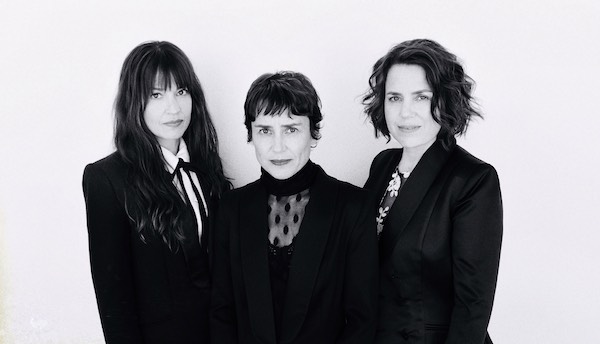Dec 9, 2025 12:28 PM
In Memoriam: Gordon Goodwin, 1954–2025
Gordon Goodwin, an award-winning saxophonist, pianist, bandleader, composer and arranger, died Dec. 8 in Los Angeles.…

Tanya (left), Rachel and Petra Haden have recorded a new album of music associated with their grandfather.
(Photo: Shervin Lainez)For all the adventurous chord substitutions and complex solos musicians might enjoy playing, it’s good to remember that the heart of music often is quite simple. It can be tempting to get lost in the fields of imagination, rather than appreciate the spirit that nourishes those fields.
The Haden Triplets’ second album, The Family Songbook (Trimeter/Thirty Tigers), is all about that spirit. Planted in the folk tradition that was the creative foundation for their father—the late bassist and DownBeat Hall of Fame inductee Charlie Haden—these 12 songs are akin to vintage black-and-white photos, haunted by hints of history and long-forgotten stories. Petra, Rachel and Tanya Haden render them with delicacy, love and respect. Their singing is warm and pure, with minimal vibrato and triads placed squarely on beats, rather than swung.
The sisters began thinking about The Family Songbook after completing their eponymous album in 2014. “We love that record,” Petra said. “But right away, we started talking about trying to do something more along the lines of a Haden family songbook.”
“Rambling Boy was our dad’s vision of doing a family album,” Tanya added, referencing Charlie Haden’s 2008 recording and its stellar lineup of guest artists. “But it didn’t turn out to be specifically our family. Even back then, we were thinking, ‘God, it would be nice to do a real Haden family album: the music of our grandfather.’”
That gentleman, Carl E. Haden, performed frequently on rural radio during the Depression era, singing original compositions as well as familiar tunes of the day. He died when the triplets were just 3 years old, but they grew up aware of his story. So, when serious work on The Family Songbook began, they asked their uncle, Carl Haden Jr., to look through his home back in Missouri for souvenirs of his dad’s work. He came up with a small booklet of songs, which longtime family friend Woody Jackson transcribed and delivered to the sisters.
“We pressed the ‘record’ button, picked out harmonies and sang,” Rachel recalled. “And all of a sudden these songs came to life. That was so great, because we’d only heard stories about Carl from our dad.”
At Electro-Vox Recording Studios in Los Angeles, with Jackson producing, they interpreted four of their grandfather’s compositions: “Ozark Moon,” “Gray Mother Dreaming,” “Memories Of Will Rogers” and “Who Will You Love.” Most of the other tracks reflect Carl’s aesthetic and the times in which he lived. The sisters knew some of the tunes well; others were new to them.
But “Wayfaring Stranger,” the album’s opening cut, always has held special meaning for them. “Our father sang this song,” Petra explained. “It was the one song he wanted to sing on the Quartet West album The Art Of The Song [1999], even though he hadn’t sung since he was a kid because polio had ruined his voice.”
“When we started recording it, Rachel started the vocal alone,” she continued. “I joined in a little later and sang the melody along with her. Then Tanya came in, singing the melody. When one of us started to sing a harmony, Woody said, ‘It sounds beautiful as it is. Let’s just keep it in unison.’”
The Family Songbook’s ultimate success lies in how Jackson and the sisters framed these tunes in ways that make the music feel intimate: the deep tremolo of Bill Frisell’s electric guitar, Greg Leisz’s ephemeral steel and Joachim Cooder’s drums—when there are any—distant and spare, adding to the atmosphere more than keeping time.
“We want to show the purity of this kind of music,” Tanya said. “If you can use technology to do that, it’s not a bad thing. Music isn’t a competition about who can make the biggest or most complex thing. Sometimes, it’s just nice to hear the song.” DB

Goodwin was one of the most acclaimed, successful and influential jazz musicians of his generation.
Dec 9, 2025 12:28 PM
Gordon Goodwin, an award-winning saxophonist, pianist, bandleader, composer and arranger, died Dec. 8 in Los Angeles.…

Belá Fleck during an interview with Fredrika Whitfield on CNN.
Jan 13, 2026 2:09 PM
The fallout from the renaming of the John F. Kennedy Center for the Performing Arts to include President Donald…

The success of Oregon’s first album, 1971’s Music Of Another Present Era, allowed Towner to establish a solo career.
Jan 19, 2026 5:02 PM
Ralph Towner, a guitarist and composer who blended multiple genres, including jazz — and throughout them all remained…

Flea has returned to his first instrument — the trumpet — and assembled a dream band of jazz musicians to record a new album.
Dec 2, 2025 2:01 AM
After a nearly five-decade career as one of his generation’s defining rock bassists, Flea has returned to his first…

Rico’s Anti-Microbial Instrument Swab
Jan 19, 2026 2:48 PM
With this year’s NAMM Show right around the corner, we can look forward to plenty of new and innovative instruments…